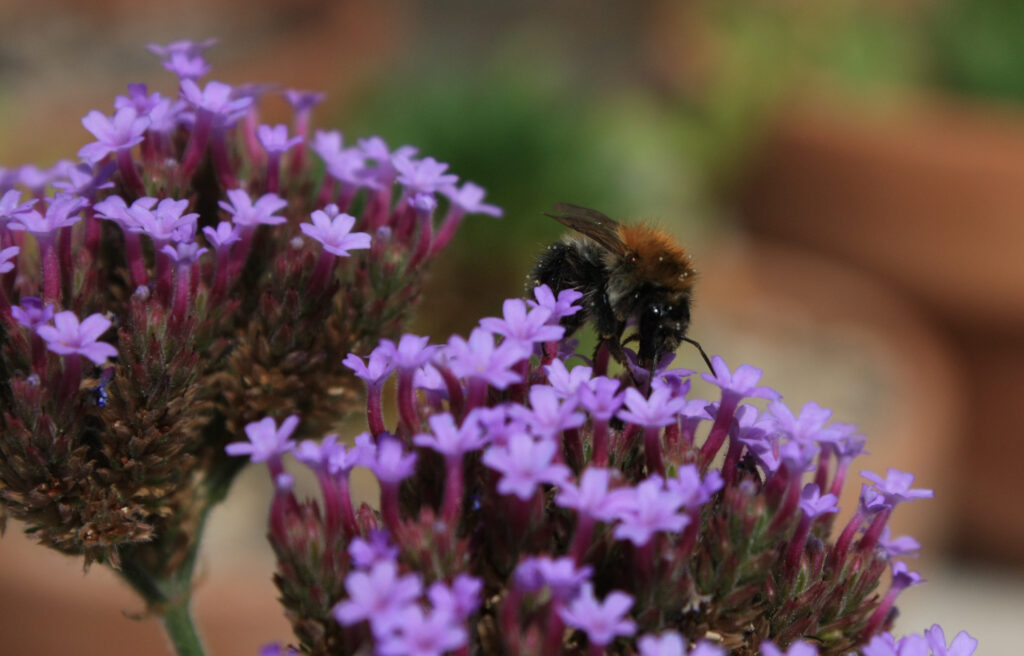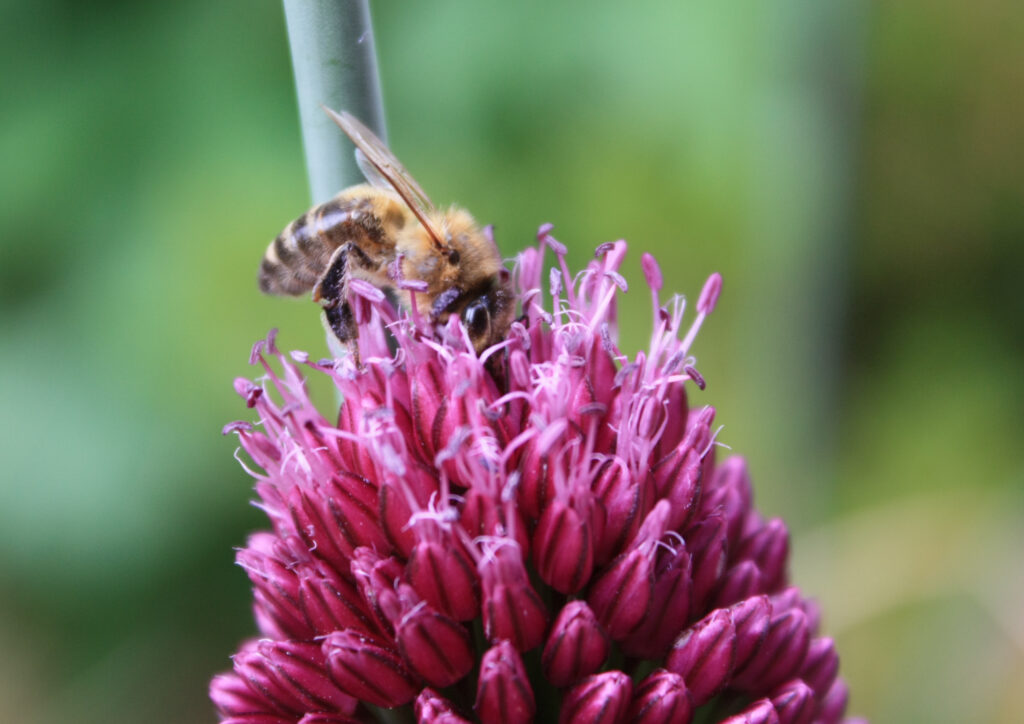I meant to write about something completely different this month. Yet, in one of newsletters which came to my inbox this week, I found again a call on the urgency of saving pollinators – or otherwise WE are going to be in trouble. In my opinion, there is a dangerous logical flaw with the utilitarian approach to conservation, which I would like to bring to light. I use examples of science and art to illustrate the paradox that leaving practical expectations behind is beneficial to humanity. It is a gentle but rebellious reminder within prevalent narrative why is it imperative to save the bees for the bees.
Almost every article or discussion around conservation contains references to how dependent we are on nature. In various ways. Said pollinators are responsible for estimated 35 % of edible crops. Consequences of climate change: droughts, floods, hurricanes, loss of lands to rising sea water, heatwaves, ocean acidification, are all problematic to human populations. We lose food, water, income sources, and places to live. Therefore we try to limit the climate change. Trees keep our cities cooler, filter pollutants, capture carbon and prevent soil erosion. So we rush to plant more trees. Yet undiscovered species of plants and animals inhabiting native forests might hold keys to cure deadly diseases. We’d better protect these forests. Amazonia distributes moisture from the ocean bringing rain deep into South America. Without it, a permanent drought looms over the continent. Ecosystems are interdependent networks, which we need in their entirety. Thus, we are trying to preserve ecosystems’ complexity.
…
The pitfall of anthropocentric attitude to saving biodiversity
While all of the above are true facts, and far longer list of examples could be assembled, there are logical consequences when those facts are used as an argument to justify an effort and expense needed for conservation. What if we knew how to cure all the diseases with our own technology? If we could produce enough food without dependence on pollinators? What if we could amend living conditions of those who are in peril of extreme weather? It is an unlikely scenario; after all we are not that advanced. Nonetheless, within this mental exercise, we could happily let thousands of species slip into oblivion and large swaths of earth become uninhabitable to anything but humans in engineered air-conditioned bubbles. Because we could afford to. After us, even a flood.
Isn’t the human-centric approach, by chance, an underlying cause for the devastation of the natural world? Isn’t doing the same thing over and over again and expecting different results a definition of madness?
Unity of nature implies equality
For me as a biologist, the evolutionary continuity of life constitutes a framework for philosophical equality. My final high school exam essay listed many pages of proofs for the unity of life forms: genetic, biochemical, structural, and ontological. All organisms in the world share the same DNA code—from bacteria, to higher plants and vertebrates, to which we belong. We also share the same biochemical pathways and molecular building blocks. The same developmental processes govern formation of mature animals, whether worms, birds or mammals . When you learnt the skeleton of the frog in your early school days, you also learnt the human skeleton, with a few minor modifications. Noticing similarities was the whole purpose of this exercise, rather than packing your head with an assembly of frog bones. Wherever you look, the universal is prevalent. The fact we can generalise the discoveries from research on model organisms to other living creatures, including humans, is a direct consequence of the unity of nature.
Remarkable powers do not entail greater rights
The modern humans didn’t descent from the sky. Instead, we are a product of evolution – a set of upgrades in a slow chain of changes originating from the primordial soup that first gave rise to unicellular microorganisms some 4 billion years ago. Three extraordinary assets converged in the human lineage: unprecedented intelligence, speech, and agile hands. (Even though, many scholars argue that prolific offspring and aggression were not less important to our success.) This combo opened a whole world of new opportunities for cooperation and advancement of culture for our species: a non-genetic transfer of knowledge. We gained the ability to produce complex tools and pass improvements onto next generations.
Yes, we do possess superior abilities. However, by all other means we are the same as all other organisms. It is only last decades that behavioural science is acknowledging that animals also plan, remember, are conscious, express emotions, develop unique personalities, and engage in seemingly pointless activities just for fun. Some also develop culture. Although tempting, I don’t want to use examples of intelligence and emotions in animals to argue we should treat nature more equally. Instead, these examples point to nature’s continuity and stepwise improvements of evolution.
There is a danger to create an order of importance and rights for existence based on intelligence or other capacities. However, exceptional abilities are just this: abilities. They give means, but not moral rights to decide fates of other life forms. If anything, the ability to even consider moral rights could prompt us to confront and perhaps acknowledge inevitable corruption tied to power. If we were to accept that power justifies pillage across species, we would be just one step from justifying all forms of crime among ourselves.
Aren’t our activities a part of nature as well?
Indisputably, we are a part of nature. It is precisely what I am arguing here. The human impact on biosphere is not a modern invention. We vastly modified landscapes and became a natural force within ecosystems already several thousands years ago. However, the fact that we belong to the natural system is also sometimes (ab)used to justify unrestricted plundering. If we are the nature personified, anything we do is natural and thus unquestionable, the argument goes. How convenient, isn’t it? Instead, being a part of nature implies an equal sign between a man and a frog in the rights to flourish. We like to keep integrity, therefore we tend to reject uncomfortable thoughts. This way we can keep a coherent view of the world and our virtues. Why then would it be good to change?
Our present systems don’t work. Ergo, we need new ones.
The times when nature was jumping at our throats and we had to ward it off with fire and spears are—for most part—long gone. (Yes, I am aware that there are places on Earth where speckles of local ecosystems are rich enough that beasts invade the gardens and snatch babies. Rather an exception than a rule, though. More often it is other way round.) The times when nature’s abundance exceeded our abilities to deplete resources are also left behind several millennia ago. Yet, we still operate with the same mindset. Our lethargic responses to modern challenges, both societal and environmental, prove we are not prepared. Theoretically, the false premises can lead to appropriate actions. More likely, however, a weak foundation results in a crumbling construction all way up. In our current condition, we are not fit to respond efficiently and timely to present-day problems. Because the state of affairs mirrors the state of the mind, we’d better find different viewing angles.
Pragmatic implications of letting go of the utilitarian mindset—lessons from science and art
Paradoxically, dropping the practical expectations is… practical. It is also deeply human and thereby satisfying. I will use scientific research and art as parables. These pursuits are probably the closest in scale and character to discussion about our relationship with nature.
Quest for knowledge fuels technological development
Greatest human endeavours are most useful when they are not attempting to be useful. Knowledge, not unlike nature, has a value on its own. Humans, as intelligent creatures, are curious. To understand is one of our basic needs. Understanding how nature works happens to be very useful as well. It enables us to make predictions about consequences of interventions into the physical or biological systems. For example cure diseases, or defy gravity to send the rockets to a nearby planet. The more we understand, the more we are capable to produce sophisticated tools to study and modify these systems.
Acquisition of knowledge is characterised by serendipity. Charles Darwin had never planned on formulating the theory of evolution while stepping on the deck of Beagle. The idea emerged when he was simply trying to make sense out of his collection of finches. One of my favourite examples of benefits of freedom in academic research is a group of forsaken microbiologist who studied bacterial immunity in 1960’s. Who would have cared how bacteria defend themselves against a peculiar type of viruses? Nonetheless, these scientists discovered that bacteria produce proteins called restriction enzymes, which can cut genetic material at precisely defined sequence of genetic code letters. Restriction enzymes revolutionarised molecular biology, enabled genetic engineering, and opened a new era in medicine. While Werner Arber, Dan Nathans, and Hamilton Smith earned a Nobel prize for their discovery, we got things like life-saving recombinant insulin.
Scientific freedom, not predefined goals, are a corner stone of progress
Because science had proven itself useful, we created an investment machinery that builds upon expectation to cash on knowledge. The assumption that research is an investment gave rise to the whole sectors of the so-called ‘applied’ or ‘translational’ science and tightly controlled metrics. Unfortunately, squeezing academics into compliance with current political or societal requirements inevitably hampers growth and innovation. Translational sciences require break-through discoveries in the first place to translate into technological solutions. It turns out that such discoveries depend on unrestricted freedom for scientists to pursue their own desire to understand how the universe works. Accordingly, scientific independence from ideology and pressure of productivity is far more profitable to progress in technology and medicine than funds spent on applied science (you can find more examples and in-depth argumentation here).
Free art is one of pillars for sustainablility
Art has been proposed as one of the pillars of the sustainability, along with economy, environment and societies. Similarly to science, art benefits us most when we are not forcing it externally to serve any particular cause. Juxtapose instances of top-down control of artists in totalitarian systems to countries and periods when artistic freedom was at its peak. Yes, we could argue that if not the patronage and hubris of those in power, oftentimes questionable in their intentions, a vast majority of historic masterpieces wouldn’t exist. Perhaps Michelangelo would have preferred to paint kittens and puppies on the ceiling of Sistine Chapel, had he had a choice. Yet, when we left this model somewhere in the XIX. century, art styles exploded along with the variety of individual pursuits. Nowadays art is considered as fundamental to equity and inclusion in societies.
The lesson emerging from these examples teaches us that oftentimes when we are trying to commercialise and exploit human propensity for higher pursuits, we lose the advantages these pursuits tend to deliver. Is it then reasonable to expect that our attitude to nature should follow a different principle? Nature has its own intrinsic value. It is worth saving because it is there. Because it is something bigger than us. We should save it because we can.
Could curious observation of nature be a cure to human superiority fallacy?
While the logical line of arguments might resonate with some, it probably doesn’t touch where the change takes place: the heart. To get there, maybe we can search our consciousness somewhere at an intersection between intellectual and emotional. From my own experience, I often reflect on impact of spending my childhood with a family cat. I am sure that an affectionate relationship with an animal did shape my perspective. Nonetheless, while the influence of emotional relationships with fluffy friends is an obvious starting point for connection to wider nature, it is sheer curiosity about the world around us, unsullied by pragmatism, that might be a propelling force to change our attitudes.
That is where gardens can be immensely helpful. Nature comes to our feet, quite literally, when only we give it a chance. We can invite nature into our lives when we replace an impoverished lawn with other plants, thereby giving all sorts of wild creatures shelter and food. At the same time, we can create beauty and immersive experiences for ourselves.

Be kind and gentle to yourself but stay vigilant about your cultural heritage
Just to be clear, I am not agitating for throwing yourselves into activism. I don’t want to convince anyone to go vegan tomorrow, give up a car, or live without desires in a cave. I merely encourage to look carefully at our beliefs and question some of the dogmas of our western cultures. Maybe, after some scrutiny, not all values we take for granted are worth clinging to. In my opinion, it is high time we abandon the ideology that all living creatures are our servants. I also object to putting a price tag on everything and resorting to fear to incite action. I don’t think we should be saving bees because otherwise we go hungry.
I call for a mindset that is open to sharing what we have and helping other life forms to thrive, irrespective of their complexity, consciousness, cuddliness and ability to express emotions. Irrespective of whether they are useful or not. In the same way as we share with and help our fellow humans. As if we were all the same. I call to give a chance to our better selves. This way, we can try to save the bees for the bees.



